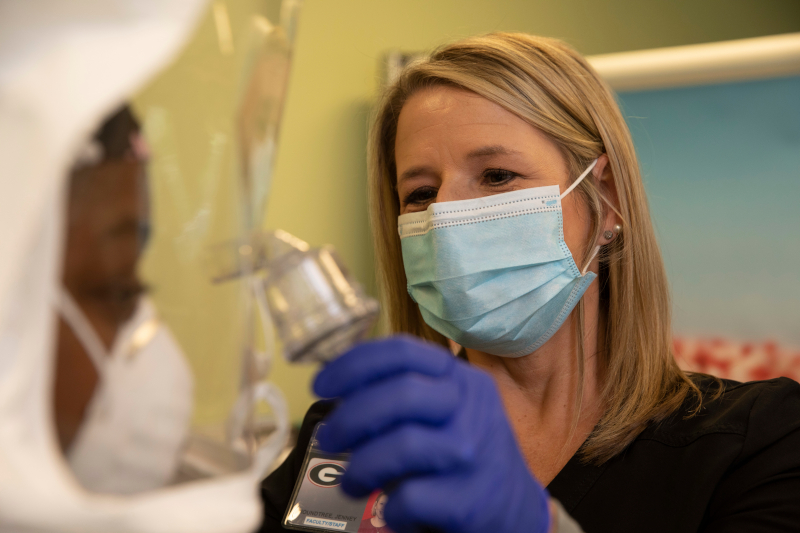As UGA’s research enterprise has grown in size and complexity over the past decade, so too have the personal health considerations and concerns for those faculty, staff and students who participate in various types of research, both in and out of the laboratory.
Enter the Research Occupational Health & Safety Program, which helps employees and students get the health evaluations and services they need to safely perform their research duties. For years the university contracted with a local health care system to handle most of the clinical and diagnostic procedures associated with research occupational health, but since March 2019 UGA has brought the program much more in-house with the addition of occupational health nurse Jenney Roundtree.
Co-located with the Clinical & Translational Research Unit on UGA’s Health Sciences Campus, Roundtree holds a twice-weekly clinic where she conducts evaluations and helps researchers get the help they need for their protocols, whether it’s an immunization or tuberculosis test, a fitting for an N95 respirator, a blood draw, or any number of other health services. Also, the vast majority of the services Roundtree can provide are free.
“Enrolling in the Research Occupational Health Program is good for the researcher’s personal health because it helps us risk assess and determine if there are available occupational health services that are recommended or required to protect the researcher while doing such an important job,” Roundtree said. “This in turn is good for the research program as a whole because it allows important work to continue that benefits so many people.”
Federal law requires that UGA offer all researchers, be they employee or student, access to an occupational health program. With a few exceptions, the program and its services are not mandatory—individuals may decline to participate—but the university must demonstrate that they have been offered.
For this reason, the general front door for “OccHealth” is UGA’s Professional Education Portal. When researchers complete their individual profile on PEP, including an occupational health questionnaire, the system will automatically inform them on how to enroll in the OccHealth program and what services are recommended.
“It’s important that people know they need to start early with their OccHealth enrollment, because some services can take a long time to deliver, sometimes several months,” said Lisa Kelly, director of research support services in the Office of Research Integrity & Safety. “A full hepatitis B immunization series, which is often recommended when working with human cells, can take up to seven months. Even a rabies series can take several weeks.”
OccHealth typically sees around 70 patients per month at its clinic. Since Roundtree was brought on board, Kelly said, turnaround time for services has dramatically improved, dropping from as long as 75 days to an average of seven days. Once they arrive at the OccHealth clinic, most people wait for less than 10 minutes before being seen.
“What we’ve tried to do is remove the ‘black box’ from around occupational health,” Kelly said. “People can see exactly where they are with their enrollment through PEP. Being on the Health Sciences Campus means we’re accessible to people without vehicles through the UGA bus line. There have been a number of significant improvements to the overall operation over the past two years.”
On Friday, March 5, at 11 a.m., Roundtree and Kelly will host a session of Research Matters Live devoted to research occupational health and safety. The pair will provide an overview of UGA’s program and explain how to enroll, as well as answer audience questions. The event is free and open to anyone at UGA; registration via Zoom is required.


